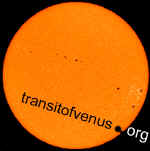http://sunearth.gsfc.nasa.gov/eclipse/transit/venus/Sun2004+2012-1.GIF
Path of Venus across the sun's disk; from Fred Espenak.
 http://www.transitofvenus.nl/details.html
http://www.transitofvenus.nl/details.html
Details and prospects for the 2012 transit. This website automatically
detects your location and depicts it on a map. It then calculates
your local circumstances (such as interior and exterior contact times) for the
2012 transit of Venus. Your time zone and daylight saving time (DST)
option are automatically selected. Or you can drag a marker to a different
observing site on a map or search for an address and it will instantly update
the data. Website also includes observing guidelines, weather prospects, a
calculator to compute the solar parallax using the timings from two sites (e.g.,
yours and someone else's), details about historic transit of Venus expeditions,
and more. Courtesy of Steven M. van
Roode.
http://sunearth.gsfc.nasa.gov/eclipse/transit/venus/Map2012-1.GIF
World visibility map of 2012 transit of Venus; from Fred Espenak.
Fred Espenak writes:
The global visibility of the 2012 transit is illustrated with the world map in figure 3 ( Low Res or High Res ). The entire transit (all four contacts) is visible from northwestern North America, Hawaii, the western Pacific, northern Asia, Japan, Korea, eastern China, Philippines, eastern Australia, and New Zealand. The Sun sets while the transit is still in progress from most of North America, the Caribbean, and northwest South America. Similarly, the transit is already in progress at sunrise for observers in central Asia, the Middle East, Europe, and eastern Africa,. No portion of the transit will be visible from Portugal or southern Spain, western Africa, and the southeastern 2/3 of South America.
http://sunearth.gsfc.nasa.gov/eclipse/transit/venus/city12-1.html
Contact times (Universal Time) and corresponding altitudes of the Sun for 121
international cities; from Fred Espenak.
http://sunearth.gsfc.nasa.gov/eclipse/transit/venus/city12-2.html
Contact times (Universal Time) and corresponding altitudes of the Sun for 60
cities throughout the USA; from Fred Espenak.
 http://www.nao.rl.ac.uk/nao/transit/
http://www.nao.rl.ac.uk/nao/transit/
The HM Nautical Almanac Office "presents an observational overview of
the transits of Venus in the telescopic era as well as the six centuries or so
at either end of this period." Details are provided for "the
rare phenomena covering the interval from the 11th century through to
the 27th century." The 2012 data, with emphasis on the
view from the United Kingdom, is at www.nao.rl.ac.uk/nao/transit/V_2012/index.html.
 proctor2012.jpg
proctor2012.jpg
World visibility map of 2012 transit of Venus; from A Popular Account of Past and Coming
Transits, by Richard Proctor; 1882.
